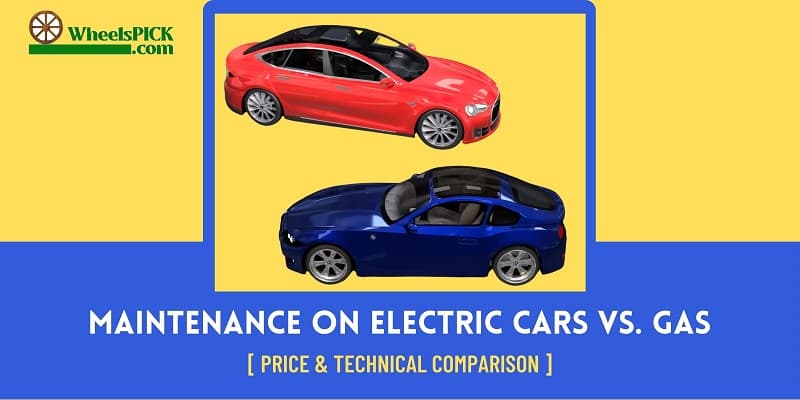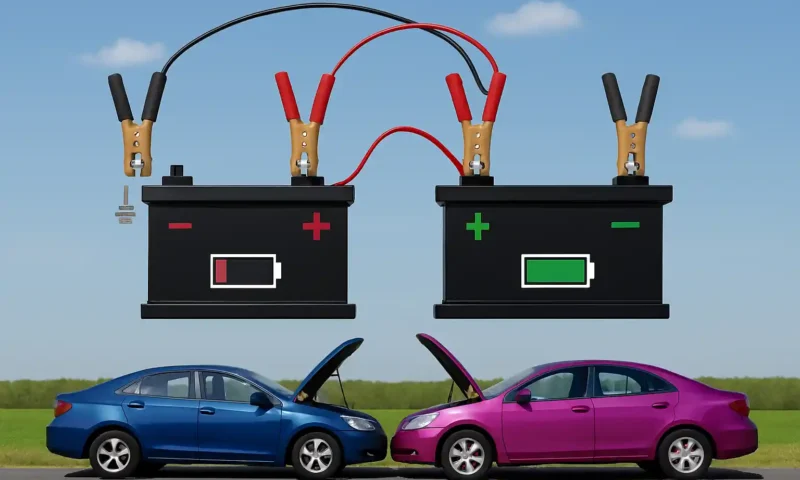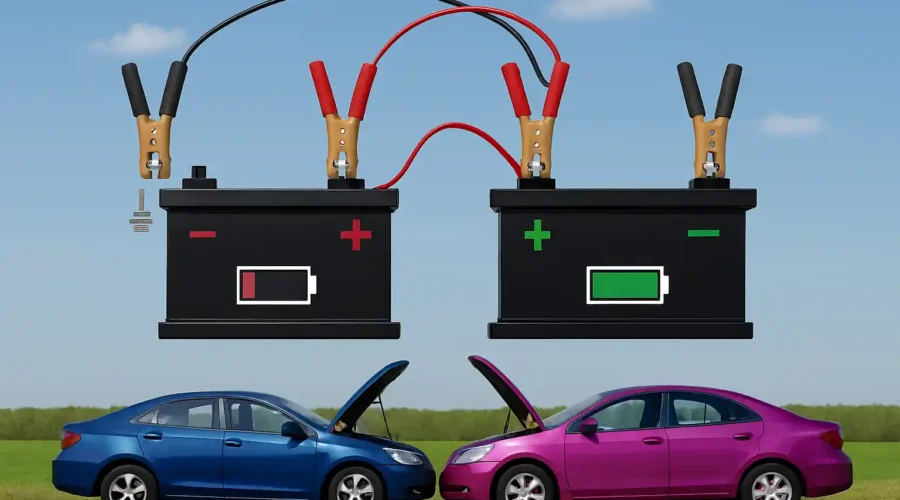It’s no secret that the costs for gas vs. EVs differ significantly. But did you know the maintenance on electric cars vs. gas varies too? If you didn’t know this already, you’re in for a ride.
Even with the typical routine maintenance for EVs and gas-powered cars, there’s more than car enthusiasts are intrigued about. One of them is how they differ in pricing and technical aspects.
Fortunately, as avid car enthusiasts, we’ve poured hours of rigorous research into understanding every minute detail and the nitty-gritty of these distinctions. So, sit back and prepare to learn about electric and gas-powered cars. Excited? So are we!
Intelligent Scanner for EV [Top 3 Amazon Bestseller]
No products found.
Electric Cars vs. Gas Cars: Which Cost More?
According to the University of Michigan’s study in 2018, the average cost for fuel of electric vehicles is approximately $485 per year, whereas moderate gas prices for gas-powered vehicles are around $1117. Moreover, costs for maintenance on electric cars vs. gas range roughly $300. Research tells us it’s about $4600 cheaper to maintain EVs than gas vehicles.
Electric Vs. Gasoline Costs

Why do EVs win? Good question. Consumers commit to EVs to skip the pricey journeys that have been a tradition for decades. According to Consumer Reports, EVs require 60% lower costs per year than gas-powered vehicles.
But then again, there’s some trade-off that needs to happen here. Generally, drivers who charge their EVs at home accumulate higher electricity bills. However, that can vary from region to region. For example, a study from 2020 showed the lifetime expenditure on EVs could be around $14,408, but again, that’s a rough estimation of individual users.
People still rely on at-home charging stations as most public stations cost higher. Thus, when drivers consider their voltage usage and fast charging options and compare them to fuel costs – it’s a win-win.
What You Need to Know About Maintaining an EV vs. Gas-Powered Car
Let’s get real, EVs don’t require oil changes or spark plug replacements, among other costs. This gives electric vehicles a more excellent leg up on gas-powered vehicles. However, EVs require basic maintenance, such as tire rotations and servicing. In any case, EVs still cost half the price compared to gas-powered cars in terms of repair and maintenance.
Traditional Automotive Maintenance: A Quick Recap

It’s no shocker that the internal combustion engines in gas-powered cars require heavy maintenance. But that’s not where it stops. Let’s take a quick gander at traditional vehicle maintenance routines.
-
Tires
There’s a lot of riding going on. Thus, routine checkups for the tires are a must. They need to be adequately inflated with apt pressure.
No products found.
-
Oil Change
This is a no-brainer; most of the costs come from fuel for gas-powered cars. It lubricates the engine parts and reverts any possible damage, friction, or grinding of the internal components.
-
Air Filters
Air filters require replacements once to twice a year, influencing the driving quality.
-
Fluids
Inspection of fluids is a must regularly for gas-powered cars. Checking windshield washer, coolant, transmission, and brake fluids requires daily assessments for a good driving experience.
-
Brakes
One way to control and eradicate brake issues is via maintenance, inspection, and repair. This also counters in professional costs.
EV vs. Gas: Which Cars Are Cheaper to Maintain?

EVs indeed seem affordable next to gasoline-engine vehicles; a lot of it has to do with the constant fuel price hikes throughout the world. Eventually, more and more people turn to invest in EVs, which have a much more affordable lifelong cost. For a clearer picture, let’s look at three vehicles’ cost ownership breakdowns.
-
BMW3 Series; $151880
-
Toyota RAV 4; $111464
-
Tesla Model 3; $110368
The costs include the purchasing prices for the vehicles split within six years. But, are there any hidden costs to it? Let’s take a gander at some of the hidden costs of electric vehicles that most novices don’t know.
-
Purchasing Price
While splurging on an EV, you’ll realize that the purchasing price is higher than gas-powered cars. The reasons include companies trying to reach economies of scale, high demands for EVs, and additional technology required to produce them.
-
Registration
Some states acquire additional taxes for road repairs or other regulations. However, EVs require zero gas. Thus, conditions obtain registration fees to assemble lost incomes. These registration fees could range from around $50-$200.
-
Premiums
Premium insurance policies for EVs are higher than gas-powered cars. With EVs, the insurance is around 25% higher and might cost more to repair and replace, adding to the premium insurance.
-
Battery Replacement
You might know all about EV batteries, but did you know that you’ll probably need a replacement in 100,000miles or eight years? An EV’s battery replacement could cost around $5600-$20,000, but given the timeline, it seems apt to many.
-
Charging Stations
A charging setup at home for an EV can cost you hefty bucks. It can cost around $1500, but the charge might go even higher when permits, labor, and other costs are countered.
-
Repairs
Even though EVs require lower repairs, when they do need one, it will cost more than traditional vehicles. For instance, Tesla’s annual repair costs around $832. EVs have tricky technical functioning that can’t be obtained via traditional ways.
Compare Electric Car Maintenance Costs vs. Gas
Let’s get a concise idea about maintenance on electric cars vs. gas and their distinctive aspects. Reports by the US Department of Energy enlightened that internal combustion engine maintenance costs are 10.1-cents per mile compared to EVs, which are merely 6.1-cents a mile.
The distinction becomes even more vivid when the maintenance for their electrical aspect is compared. The repair pricing for EVs is around 22% lower. Gas-powered cars’ repairs cost about $200, and EVs cost approximately $77.
Furthermore, the overall costs of maintaining a lightweight EV are lower than $0.7/mile, whereas the rates shoot up for combustion engines at $.10/mile. Other maintenance costs solely applicable to gas engines are oil changes, cooling systems, tune-up, drive belt replacements, transmission servicing and spark plug replacements. With an EV, you can wash your hands off these costs.
Costs and Benefits of Electric Cars vs. Conventional Vehicles
So, other than the advantage of the cost inequality, what are the other benefits of EVs having lower costs for maintenance? Good question! Skim through to know.
-
At-Home Stations
If you have an at-home charging station, you know that it doesn’t get any better. This facility reverts you from multiple overhead costs such as fueling at crowded gas stations, waiting in line, driving back and forth constantly, and more.
-
Lower Maintenance
This one’s not a big surprise, but electric vehicles don’t require regular fuel or maintenance; thus, you can cut unnecessary costs by more than half of what you spent with traditional automobiles.
-
Fuel Price
EVs require no fuel to run. Thus, drivers are independent of fuel price hikes.
-
Lower Run Costs
In contrast, EV running cost is lower per mile compared to gas-powered vehicles. EV takes the winning cup for its eco-friendly power sources when the distance covered and fuel prices are compared.
-
Tax & Government Incentives
To encourage EV usage, governments in many states provide packages, subsidies, reduced tax benefits, and multiple incentive plans. This urges the buyers to invest in electric vehicles and enjoy lifelong cost savings.
Fuel Costs for Electric Cars vs. Gas-Powered Cars
Are you still confused between the costs and prices for EVs and gas-powered vehicles? Worry not; the table below will clear up any remaining confusion.
| Costs | EV | Gas |
|---|---|---|
| Average Operating Costs | $485/year | $1117/year |
| Maintenance Costs | Low | High |
| Repeated Costs | Low | High |
| Battery Pack Replacement Cost | High | Low |
| State & Federal Incentives | Available | None |
| Internal Combustion Engine Cost | None | High |
| Gasoline vs. eGallon | About $1.16 | About $2.85 |
| Lifetime Costs | Low | High |
| Cooling System Costs | None | High |
| Oil Change Costs | None | High |
Electric Cars vs. Gas Cars: The Operating Costs
Here’s a synopsis of what it costs to operate an EV compared to gas-powered cars in different states.
- The annual cost to run an EV is $3679 in the US compared to fuel-powered cars at $4336.
- Oregon’s cheapest average cost to run an EV is $2474.
- Michigan’s most high-end EV costs around $5076 to run.
- Virginia’s cheapest gas-powered car runs at $3614/year.
An EV cost for charging in the US is around $755, with fuel refills costing approximately $1615/year. On average, electric vehicle costs and prices are much lower.
Electric Vehicle vs. Gas Car Tax
Without the EV subsidies and incentives, tax on these vehicles could be pretty expensive compared to gas-powered cars. In the states, the cost of taxes on EVs per year is around $827. At the same time, the average for gas-powered is $545/year approximately.
Lifetime Costs for Electric vs. Gas Cars
So, why will EV cost you cheaper in the long run? It’s simple math and numbers. Users can quickly figure out their lifetime expenditure based on the model they purchase and current costs on the EV.
Moreover, drivers need to counter maintenance, charging rates, electrical costs region-wise, overall drive plan, and the model’s efficiency cost per year to get a roundabout estimate. You have an approximate estimate to compare the figure to a generic gas-powered vehicle.
Additionally, multiple reports and studies get you straight in these calculations, such as the 2020 Consumer Reports. To get the full picture, they compared nine electric vehicles to three gas-powered cars, including all genres. The reports illustrate EV savings as high as $6000-$10,000. In contrast, gas-powered vehicles are far more expensive.
Needless to say, you will be doing your bank account a generous favor throughout your EVs lifetime.
Maintenance Comparison of Electric Cars vs. Gas
So far, we understand that due to lower replacements, maintenance, and the complete avoidance of fuel prices, EVs are an affordable, ground-breaking alternative. To prove that, a study was researched via thorough driving cost analysis on AAA’s 2019.
The costs included repairs, oil changes, tires, and brake costs over three years. The costs were higher than expected, with EVs costing much lower due to no engine maintenance or oil change. The costs/mile for around 45000 miles were;
Hyundai Kona Electric – $0.066/mile/$2970 compared to Hyundai Kona – $0.0909/mile/$4091. And, Mini Electric – $0.066/mile/$2970 compared to Mini – $0.0853/mile/$3839.
Additionally, for lightweight electric batteries, the vehicles cost lower than $.07/mile, and conventional engines cost approximately $.10/mile, according to the US Department of Energy in 2021.
Maintenance and Safety of Electric Vehicles: Safety Requirements

Commercial EVs must meet the statutes of the Federal Motor Vehicle Safety Standard. These electric vehicles must pass some common security tests for approval before getting released. The high-voltage EVs ranging from 100-600V have specific regulations to meet as well.
The battery packs need sealed shells and testing on their capacities of resistance to water, collision, fire, humidity, short circuits, high temperatures, vibrations, and overcharging. Manufacturers must maintain insulated high voltage safety procedures during production to avoid short courses and collision consequences.
Lastly, EVs require a lower central gravity compared to gas-powered cars, thus, enabling them to roll smoothly and be stable.
Electric Car Maintenance Costs vs Gas
Electric vehicles (EVs) and gasoline-powered cars each come with their own unique set of maintenance requirements and costs. Understanding these differences can help potential car buyers make informed decisions about which type of vehicle best suits their needs and budgets.
Electric Car Maintenance vs Gas
When comparing the maintenance needs of electric cars to those of traditional gasoline cars, several key differences stand out. These differences largely stem from the fundamental variations in their propulsion systems.
Electric Car Maintenance
Electric cars have fewer moving parts compared to gas cars, which results in several maintenance benefits:
- Fewer Fluids: EVs don’t require oil changes because they lack the complex internal combustion engines found in gas cars. The main fluids to monitor are the coolant for the battery and the windshield washer fluid.
- Brake Wear: Regenerative braking systems in EVs help reduce wear and tear on brake pads, often extending their lifespan significantly compared to gas cars.
- No Exhaust System: EVs do not have exhaust systems, so there’s no need to replace mufflers, catalytic converters, or other related components.
Gas Car Maintenance
Gasoline-powered vehicles have a more complex maintenance regimen due to their intricate mechanical systems:
- Regular Oil Changes: Internal combustion engines require regular oil changes to keep the engine running smoothly.
- Exhaust System Repairs: Components such as the catalytic converter, muffler, and exhaust pipes may need periodic replacement.
- Brake Maintenance: Gas cars typically experience more brake wear as they rely solely on friction braking, leading to more frequent brake pad replacements.
- Transmission Fluid and Filter Changes: Unlike many EVs, gas cars require maintenance of their transmission systems, including fluid changes and occasionally filter replacements.
Electric Cars vs Gas Cars Maintenance
The cost and frequency of maintenance can vary significantly between electric and gasoline vehicles. Let’s break down the typical maintenance schedules and costs associated with each.
Maintenance Schedules
Electric Cars
- Battery Coolant Check: Every 50,000 to 100,000 miles.
- Brake Fluid Check: Every 20,000 to 30,000 miles.
- Tire Rotation: Every 7,500 to 10,000 miles.
- Brake Pads Replacement: Every 50,000 to 70,000 miles.
Gas Cars
- Oil Change: Every 3,000 to 5,000 miles.
- Brake Fluid Replacement: Every 20,000 miles.
- Transmission Fluid Change: Every 30,000 to 60,000 miles.
- Spark Plugs Replacement: Every 30,000 to 100,000 miles, depending on the type.
Maintenance Costs
| Maintenance Item | Electric Car Cost | Gas Car Cost |
|---|---|---|
| Oil Change | N/A | $40 – $100 |
| Brake Pad Replacement | $100 – $300 | $150 – $500 |
| Battery Coolant Check | $150 – $300 | N/A |
| Transmission Fluid Change | N/A | $80 – $250 |
| Exhaust System Repair | N/A | $300 – $1,200 |
| Total Annual Maintenance | $500 – $1,000 | $1,200 – $1,800 |
The table above illustrates the estimated maintenance costs for typical maintenance items over a year. While electric cars generally have lower routine maintenance costs, the potential for battery replacement, which can be a significant expense, must also be considered. However, many EV manufacturers offer warranties that cover battery replacements for a set number of years or miles.
Maintenance on Electric Cars vs Gas
Long-Term Considerations
Battery Longevity and Replacement: One of the most significant maintenance concerns for EVs is the battery. While most modern EV batteries are designed to last between 8 to 15 years, replacement costs can range from $5,000 to $15,000. However, advancements in battery technology and the introduction of recycling programs are helping to reduce these costs and environmental impacts.
Technological Advancements: Electric cars benefit from continuous improvements in technology, including over-the-air software updates that can enhance vehicle performance and reduce the need for physical maintenance.
Environmental Impact: EVs are typically more environmentally friendly than gas cars, as they produce no tailpipe emissions and often have lower lifecycle greenhouse gas emissions. This factor can also translate into lower maintenance related to emission control systems.
Reliability and Durability
Electric vehicles often boast higher reliability due to their simpler mechanical structure. The fewer moving parts, the less there is to go wrong. Conversely, gasoline cars, with their intricate engines and exhaust systems, have more potential points of failure and require more frequent maintenance.
When considering the maintenance aspects of electric cars versus gasoline cars, EVs generally offer lower ongoing maintenance costs, thanks to their simpler mechanics and fewer fluid changes. However, potential battery replacement costs and the current state of charging infrastructure are important factors to consider. Gasoline cars, while having higher regular maintenance costs, benefit from well-established maintenance networks and lower initial purchase prices.
Ultimately, the choice between an electric car and a gasoline car should be based on a combination of factors, including your driving habits, environmental concerns, and long-term financial considerations.
FAQs (Frequently Asked Questions)
Q1. Do Electric Cars Need More Maintenance?
A) EVs don't require an oil change or engine maintenance and encounter lower wear and tear. Thus, they require lower maintenance than conventional internal combustion engines.
Q2. Do Electric Cars Need Oil Changes?
A) EVs don't require routine oil changes, as the moving parts don't require lubrication.
Q3. Do Electric Cars Cost More Than Gas Cars?
A) EVs cost around $485 per year, while fuel prices for gas-powered car average at $1117 a year.
Q4. What About the Cost of Installing a Charging System for My New EV?
A) If your residence has a 240V circuit, the installation should cost around $250-$400. But, mounting the station will cost approximately $400-$1700.
Q5. How Much Do You Save with an Electric Car?
A) On average, EV users can save up to $1600 a year.
Q6. Insurance Cost Difference Between Electric & Gas Cars
A) EV models cost approximately 15% greater than gas-powered vehicles. The insurance rate for premium models might increase by another 6-40%.
Q7. Is Charging an Electric Car Cheaper Than Gas?
A) If users can acquire the best portable EV chargers or a station at home, the cost will be significantly lower than gasoline-powered fuel costs. It's also cheaper at public charging outlets.
Q8. Is It Better To Buy an Electric or Gas Car?
A) EVs have better energy efficiency rather than gas-powered cars. The fact of EV power is that the battery's conversion rate is 77% greater energy than gas.
Final Words
The bottom line is that a chunk of these differences illustrates that it solely depends on the usage rates and practical habits before making a definite splurge. There are pros and cons for each of these models. Thus, consumers make a trade-off based on fuel costs, maintenance costs, and other features.
Even the most prominent distinctions between maintenance on electric cars vs. gas tell us that some prefer environmental benefits while others prefer convenience over any other technical specification. So, which trade-off are you willing to devote to?
Weighing out factors such as budget, preference, mileage, the distance between gas or electric vehicle charging stations to your residence, and warranties is just the beginning of buying considerations before the lifelong investment. Good luck!





















While I understand the underlining analysis, its clearly skewed in favor of electric vehicles. It arbitrarily chooses what costs to include and what to exclude when comparing the two types of vehicles when comparing overall costs. For example, there’s a cost included for the exhaust system repairs on the gas powered vehicle. I have 3 vehicles all over 10 years old and have yet to need repairs on that system yet. At some point I will need to make those repairs but also true for the Electric vehicle battery replacement. Both are true costs that must be included in any analysis.
Then there’s the insurance cost, illegal to operate without it, and while not an operation cost, it is an additional annual expense of the electric vehicle each and every year. Why were these expenses left from the analysis? Probably because it would show the electric vehicle to be more expensive.
How would the numbers change if you added the battery replacement that by the author’s own evaluation could top out at$20,000 in as little as 8 years. There’s also unanswered questions for costs associated with high or low mileage users. How do the numbers change if someone drove only 4,000 miles per year? would the battery still need to be replaced in 8 years, if not, then when if after 10 years the vehicle only had 40,000 miles.
There are way too many unknowns and for the average car owner, maintenance cost are still relatively unknown for every scenario in life. Can the average Joe or Jane risk a $5,000 to $20,000 battery replacement on top of the purchase price?
Thanks for sharing your perspective — you raise some fair points. The goal of the article was to compare common, predictable maintenance costs, which is why some items (like battery replacement or insurance) weren’t included in the main breakdown. Those costs can vary widely depending on location, driving habits, and the specific model, so including them would have required a lot of assumptions that might not apply to every reader.
That said, you’re absolutely right that both gas vehicles and EVs have potential big-ticket expenses over their lifespan — exhaust repairs for one, battery replacements for the other — and those risks are worth considering before making a purchase. I’ll look at updating the article to address more “what if” scenarios like low annual mileage and battery longevity, so the comparison can be even more balanced.
Appreciate you taking the time to point these out — these kinds of discussions make the topic much richer for everyone reading.